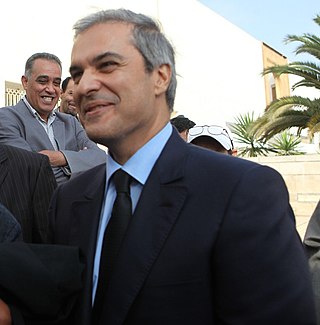
Prince Moulay Hicham of Morocco is the first cousin of King Mohammed VI and Prince Moulay Rachid. He is the son of Prince Moulay Abdallah of Morocco, the late brother of the late King Hassan II, and Princess Lalla Lamia Solh, daughter of Riad Al Solh, the first Prime Minister of Lebanon. He is also the cousin of Prince Al-Waleed bin Talal of Saudi Arabia, whose mother Mona Al Solh is another daughter of the Lebanese family. Under the Moroccan constitution, Moulay Hicham stands fifth in the line of succession to the Alaouite throne.
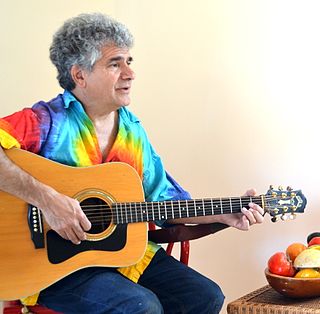
Darryl Cherney is an American musician and environmental activist. He is a member of the Earth First! environmental movement. Born and raised in New York City, he lives in Humboldt County, California.

Democratic Way is a legal Hoxhaist Marxist-Leninist political party in Morocco led by Mustapha Brahma and includes former members of the heavily repressed Moroccan Communist Party and the Marxist-Leninist Moroccan Movement.
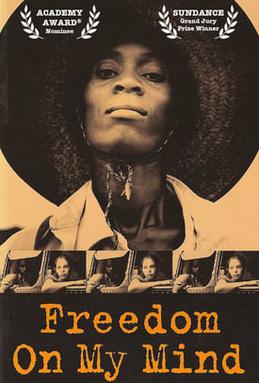
Freedom on My Mind is a 1994 feature documentary film that tells the story of the Mississippi voter registration movement of 1961 to 1964, which was characterized by violence against the people involved, including multiple instances of murder.

Abdellah Taïa is a Moroccan writer and filmmaker who writes in the French language and has been based in Paris since 1999. He has published eight novels, many of them heavily autobiographical. His books have been translated into Basque, Dutch, German, English, Italian, Portuguese, Romanian, Spanish, Swedish, Danish and Arabic.

The Moroccan protests are a series of demonstrations across Morocco which occurred from 20 February 2011 to the fall of 2012. They were part of the larger Arab Spring protests. The protests were organized by the 20 February Movement.
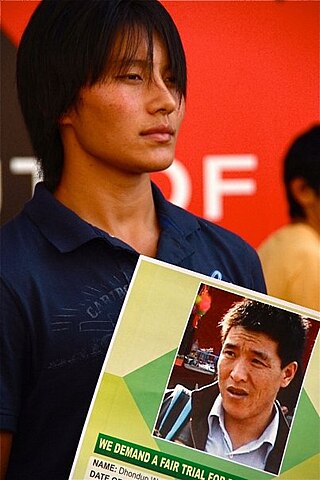
Leaving Fear Behind, also known as Leaving Fear behind: I Won't Regret to Die, is a documentary movie from Dhondup Wangchen and Jigme Gyatso about communist Chinese repression of Tibet. It was premiered in 2008 in the year when the 2008 Summer Olympics took place in Beijing, China.

Burhan Ghalioun is a French-Syrian professor of sociology at the Université de Paris III Sorbonne University in Paris, and the first chairman of the Syrian opposition Transitional National Council (SNC). He was named chairman on 29 August 2011. His chairmanship was criticized for his perceived closeness to the Muslim Brotherhood, his early reluctance to arm opposition forces, and what opponents called the autocratic nature of his leadership. On 17 May 2012, feeling he had become an increasingly divisive figure for the council, Ghalioun resigned.
Jadaliyya ("dialectic") is an independent ezine founded in 2010 by the Arab Studies Institute (ASI) to cover the Arab World and the broader Middle East. It publishes articles in Arabic, French, English and Turkish, and is run primarily on a volunteer basis by an editorial team, and an expanding pool of contributors that includes academics, journalists, activists and artists.
On 10 March 2012, Amina El Filali (1996–2012), a 16-year-old girl from Larache, Morocco, committed suicide by taking rat poison, after she was forced by her family to marry a man who had raped her when she was 15. According to Article 475 of the Moroccan penal code, the rapist was allowed to avoid prosecution by marrying his victim. This incident drew much attention to Moroccan law, and many people expressed a desire to have the law changed. Local human rights groups also called for the repeal of Article 475 of the Moroccan penal code, which de-criminalises a rape if the rapist later marries their victim. Two years after the suicide, the parliament decided to modify Article 475; it was edited in 2014.

How to Start a Revolution is a BAFTA Scotland Award-winning British documentary film about Nobel Peace Prize nominee and political theorist Gene Sharp, described as the world's foremost scholar on nonviolent revolution. The 2011 film describes Sharp's ideas and their influence on popular uprisings around the world. Screened in cinemas and television in more than 22 countries it became popular among the Occupy Wall Street Movement. A book of the documentary, Gene Sharp: How to Start a Revolution, was released in October 2020.

5 Broken Cameras is a 94-minute documentary film co-directed by Palestinian Emad Burnat and Israeli Guy Davidi. It was shown at film festivals in 2011 and placed in general release by Kino Lorber in 2012. 5 Broken Cameras is a first-hand account of protests in Bil'in, a West Bank village affected by the Israeli West Bank barrier. The documentary was shot almost entirely by Palestinian farmer Emad Burnat, who bought his first camera in 2005 to record the birth of his youngest son. In 2009 Israeli co-director Guy Davidi joined the project. Structured around the destruction of Burnat's cameras, the filmmakers' collaboration follows one family's evolution over five years of turmoil. The film won a 2012 Sundance Film Festival award, it won the Golden Apricot at the 2012 Yerevan International Film Festival, Armenia, for Best Documentary Film, won the 2013 International Emmy Award, and was nominated for a 2013 Academy Award.
Tamer El Said is an Egyptian filmmaker. He wrote, produced and directed numerous films including Take Me (2004), an award-winning documentary about five friends who unwittingly became political prisoners in Morocco, and the short film On a Monday (2005) on an old married couple who rediscover their relationship. His first fiction feature In the Last Days of the City was shot in Cairo, Berlin, Baghdad and Beirut and premiered in 2016 at the Berlin International Film Festival. He is co-founder of several independent initiatives in Cairo, including Cimatheque Alternative Film Centre, Mosireen, and Zero Production.
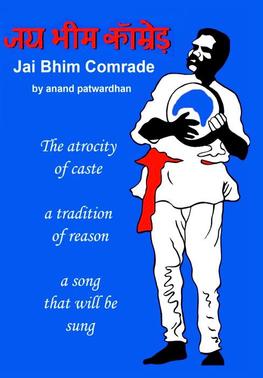
Jai Bhim Comrade is a 2011 Indian documentary film directed by Anand Patwardhan. The film begins with a description of police violence in the 1997 Ramabai killings. It goes on to explore various aspects of the lives and politics of Dalit people in Mumbai. The film took 14 years to produce, and was released in 2011 after the conclusion of the court trials that followed the Ramabai incident. The film was widely shown both nationally and internationally, and received an overwhelmingly positive reaction. It has won numerous national and international awards.
AbdelRahman Mansour is an internet activist, journalist and human rights defender. In 2011, he came up with the idea of turning Egypt's National Police Day on 25 January into a Facebook event, "Revolution of the Egyptian People", sparking the online campaign for pro-democracy demonstrations that later snowballed into a popular uprising.

475 is a 2013 Moroccan documentary film by director Nadir Bouhmouch. The film explores sexual violence and women's rights in Morocco through the Amina Filali affair, a young girl who committed suicide after being forced to marry her rapist in 2012.

Cassie Jaye is an American film director, best known for directing the 2016 documentary film The Red Pill about the men's rights movement.

Deepika Narayan Bhardwaj is an Indian journalist, documentary film-maker and men's rights activist. Bhardwaj rose to prominence after producing the documentary Martyrs of Marriage, which covered abuses of criminal section 498A by brides and their families. She also exposed a conspiracy of alleged victims in the Rohtak sisters viral video controversy by interviewing the witnesses and collecting proof. She has produced and directed the documentary India's Sons in 2021.
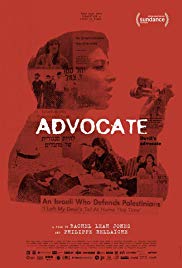
Advocate is a 2019 Israeli documentary film, directed by Rachel Leah Jones and Philippe Bellaïche. The film premiered at the 2019 Sundance Festival, and went on to win top prizes at Thessaloniki Documentary Festival, Kraków Film Festival, Hong Kong International Film Festival and Docaviv Festival. Advocate won the Emmy for Best Documentary in the 42nd News and Documentary Emmy Awards.

On the Record is a 2020 American documentary film directed by Kirby Dick and Amy Ziering. It centers on allegations of sexual abuse and harassment against hip-hop mogul Russell Simmons. Executive producer Oprah Winfrey publicly withdrew from the film shortly before it was released, citing "creative differences", severing a production deal with Apple TV+. The film premiered at Sundance on January 25, 2020, and was acquired by HBO Max, which released it digitally on May 27, 2020.
















